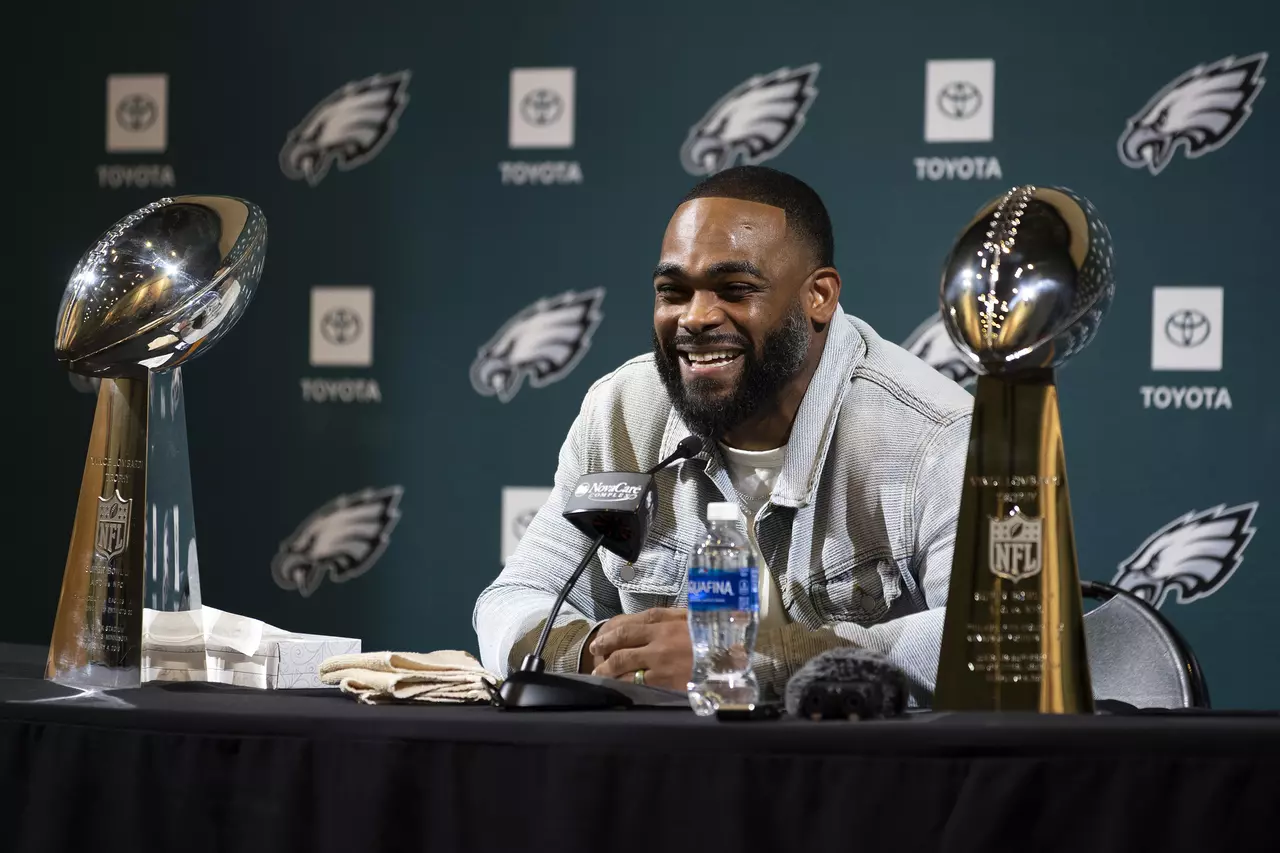

Marcus Hayes: Can the return of Brandon Graham fill the leadership void on the Eagles defense?
PHILADELPHIA — After the Eagles won Super Bowl LIX, Jeffrey Lurie told some NFL folks close to him that his greatest concern for the upcoming season had little to do with the talent level that would return, even with personnel losses looming. He didn’t worry about the salary cap, though it presented gnarly challenges, nor did he worry about the draft, though their title meant they were ...

Brandon Graham announced his retirement from the Philadelphia Eagles on March 18, 2025.
Monica Herndon/The Philadelphia Inquirer/TNS
PHILADELPHIA — After the Eagles won Super Bowl LIX, Jeffrey Lurie told some NFL folks close to him that his greatest concern for the upcoming season had little to do with the talent level that would return, even with personnel losses looming. He didn’t worry about the salary cap, though it presented gnarly challenges, nor did he worry about the draft, though their title meant they were scheduled to pick last in every round.
He worried about a void in leadership. He worried about life after defensive end Brandon Graham.
He was right to worry.
Those worries diminished Tuesday.
BG’s coming back.
He’s coming back because the Birds don’t have enough good defensive ends and edge rushers. Nolan Smith and Ogbo Okoronkwo are hurt, Za’Darius Smith retired, and rookie Jihaad Campbell isn’t ready. Only four teams have fewer than the Eagles’ 11 sacks — only 3 1/2 have come from edge rushers — and they rank 22nd against the run.
Worse, though, the defense often plays without focus, discipline and physicality. That’s where leadership comes in. That’s where Brandon Graham comes in.
“I think they got everything they need,” he said during his comeback announcement on his podcast.
He knows that’s not true. He knows the Birds lack playmakers and professionalism. He hopes to deliver both.
Will he be enough?
Through seven games this season, no one has stepped into the roles vacated by Graham, the hero of the franchise’s first Super Bowl win, and cornerback Darius Slay.
Slay, a bubbly personality and a master of his craft, spent the last five of his 12 full seasons in Philadelphia, starring and mentoring and bringing in banana pudding before the Eagles cut him in the offseason for salary-cap purposes. He’s in Pittsburgh now.
Graham played more games than any other player over his 15 years in Philadelphia. He endured injuries; he endured comparisons to Earl Thomas and Jason Pierre-Paul, a star safety and a star defensive end drafted immediately after him in 2010; he endured lining up too far from the quarterback in Jim Washburn’s “wide-9” configuration, then endured lining up too far from the line of scrimmage in Bill Davis’ 3-4 scheme.
He hated most of it, but he did it all at 100%, and did it all with a smile, and he went all-out every practice and every game and every play. Moreover, he encouraged his teammates to buy in, too. He dragged them through the mud.
Why? Because he knew that anything less would lead to losing, and even when the team lost, BG was a winner.
That’s leadership.
That’s what the Eagles lack today.
After Graham’s tearful retirement in March, Lurie posted a statement that conveyed his admiration:
“The way he played the game and the way he carried himself … earned the respect of his coaches, teammates, and fans.”
That strip-sack of Tom Brady in Super Bowl LII didn’t hurt, either.
Graham was a playmaker who loved to play, loved the game, and loved Philly. That guy does not exist today in the Eagles locker room. That guy will exist tomorrow in the Eagles locker room, in his cubicle stuffed with shoes and bobbleheads and an outrageous number of colognes.
For the next 12 weeks and beyond, he will fill the void he left.
It’s not like they completely lack leaders.
Quarterback Jalen Hurts has a steady hand and a matchless work ethic, but he has deficiencies in his game and he will forever be a chilly teammate; it is his nature. Jordan Mailata, who took over Graham’s weekly radio show, is every bit the person and player Graham is, but he’s an offensive lineman. So is Lane Johnson, a strong, silent type, Mailata’s bookend at tackle and his polar opposite in personality.
The issue, of course, is that all three of those high-character, high-output players play offense.
Where are the defensive leaders?
Leadership was supposed to start coming from third-year defensive tackle Jalen Carter, but between a shoulder injury, a heel injury, poor conditioning and an ejection for yet another foolish act, Carter clearly is not ready for the responsibility. He spat on Dak Prescott on national TV before the first snap of the first game, which earned him the expulsion and lost him the trust of his coaches. He then committed a penalty in each of the next four games and leads defensive linemen with five penalties.
After the Dallas fiasco, defensive coordinator Vic Fangio said:
“To be considered a leader, actions speak louder than words, and he’s got to lead through his actions.”
How about fourth-year DT Jordan Davis? Well, it’s tough to present leadership when it takes you three years to lose the weight you should have lost in the first year, and it’s tough to carry clout in the locker room when you’ve forced one fumble and managed just 5 1/2 sacks in your first 3 1/2 seasons.
Both of those players have the capacity to be leaders. They just aren’t there yet.
Who is? Reed Blankenship, an undrafted, undecorated safety on the last year of his deal? Nakobe Dean, who’s missed half the Eagles’ last 44 games at linebacker because of injury? Zack Baun, who’s been a full-time starter for just 1 1/2 of his six seasons?
No.
Not yet, anyway.
Maybe Graham’s return will speed their development.
____